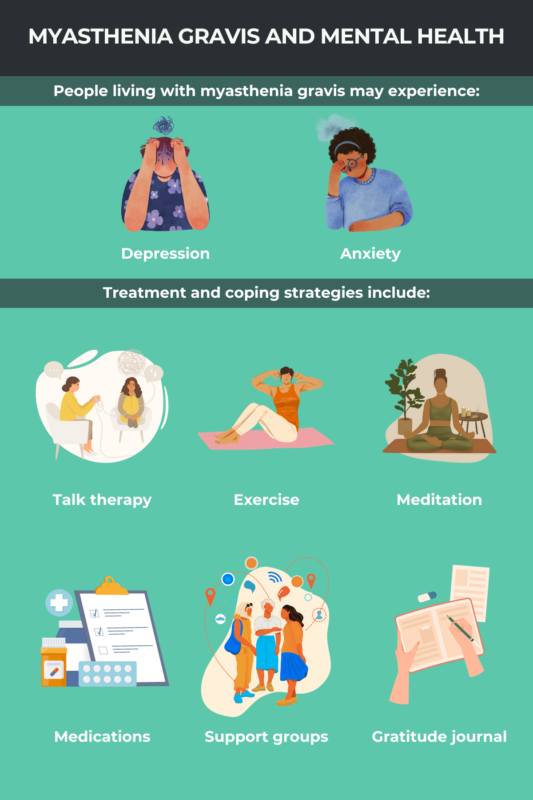 Discussion
Discussion
Myasthenia gravis and mental health
Living with myasthenia gravis (MG), a chronic immune neuromuscular disorder, can be very challenging, and the physical impact of the disease can also affect your mental health. If you have MG, you might experience symptoms such as muscle weakness and fatigue, but you may also be dealing with feelings of uncertainty or anxiety beneath the surface.
Perhaps you’re finding that completing everyday tasks is taking a toll, both physically and emotionally. Dealing with these limitations might lead to frustration, or even depression. This is a common experience, especially for those with more severe forms of MG.
Coping with a chronic illness like MG can also stir up a mix of emotions, including sadness, anger, and grief over the changes in your physical abilities. The stress of managing MG symptoms, medications, and healthcare appointments can add to your emotional load.
Additionally, some medications for managing symptoms may have side effects that can affect your mental health. Corticosteroids, for example, can lead to mood swings and emotional changes.
Despite all this, many people with MG develop resilience and effective coping strategies for maintaining their mental health. Lifestyle changes such as exercising and maintaining healthy sleep habits can have positive effects on how you feel.
Know that you’re not alone. Resources and support are available to help you navigate mental health challenges. If you need help, reach out to healthcare providers, mental health professionals, and myasthenia gravis support groups.
Understanding your mental health needs and learning to care for your emotional well-being can make a positive difference in your quality of life.
Accepting the diagnosis
It’s not unusual to feel overwhelmed after receiving life-altering news like an MG diagnosis. You may experience myasthenia gravis complications and many different emotions, such as confusion, anger, fear, and grief. You may even go through the five stages of grief: denial, anger, bargaining, depression, and acceptance.
Give yourself permission to feel these emotions and express them in healthy ways. Talking to family and friends, or a mental health professional, can be very beneficial.
Educating yourself about MG, its causes, treatment, and complications can help demystify the disease and empower you to make informed decisions about living with MG.
“Education is such a key piece to strengthening mental health for people living with MG,” says Jack Veitch, manager of Community Engagement and Education with the Canadian Mental Health Association in Haliburton, Ontario, who has worked with the Myasthenia Gravis Society of Canada. “Better mental health takes resiliency and awareness, and knowledge, so that if a problem does present itself, people already have the tools to activate a plan for wellness.”
Part of that education is learning about some of the most common symptoms, including droopy eyelids, blurred vision, slurred speech, muscle weakness in the arms and legs, and muscle twitching. It may help to know that each person’s experience of the disease is unique.
Everyday actions that you might take for granted, such as chewing, swallowing, and walking, may become difficult. Devoting time to figure out what triggers your symptoms, and how to alleviate them, can help you regain a sense of control over your health and well-being.
Work with your healthcare team to personalize your myasthenia gravis treatment plan. This may involve medications, lifestyle adjustments, counseling, therapy, and support groups.
“Connect with a peer or social group,” Veitch says. “Go for a walk, get some natural light. Spend time with loved ones. Get involved with hobbies or volunteering. Reach out and connect and talk with somebody.”
Acceptance doesn’t mean you are giving yourself over to MG, but rather, it means acknowledging the disease as part of your life and finding ways to manage and thrive.
Depression
Some people with MG may experience depression at some point in their disease course.
Two key features characterize depression, according to Veitch:
- prolongment: when symptoms of depression persist for longer than two weeks
- impairment: when depression causes emotional distress, social withdrawal, and the inability to work or take care of yourself.
“The mood, the feelings, the symptoms, they start to last too long, and they start to impair functionality on a day-to-day basis,” Veitch says. “When I see heightened prolongment and impairment, that’s when I encourage people to explore resources for their mental health and wellness.”
Symptoms of myasthenia gravis mental health challenges and depression may include:
- sadness lasting for weeks or months
- inability to sleep
- lack of appetite
- strained relationships
- problems focusing at work
- no interest in being active
- suicidal thoughts.
There is no set time to reach out for care if you have feelings of depression.
“I tell people they don’t have to reach a point of high-level impairment or disruption to access formalized care,” Veitch says.
Options for getting help for depression include:
- healthcare professionals, such as a family doctor
- psychotherapist or counselor
- support group, either online or in-person
- crisis hotlines, such as calling or texting 988.
Speak to your personal healthcare provider about whether you may need medication for depression. Many employers offer mental health support through employee assistance programs, as do schools and universities.
For severe depression, inpatient treatment or a residential program may be recommended.
Anxiety
Living with MG can lead to increased levels of anxiety — called generalized anxiety disorder when ongoing anxiety is hard to control and interfere with daily activities.
MG’s fluctuating and unpredictable muscle weakness and disease progression can contribute to anxiety, as can some medications that help manage MG symptoms but have side effects that can cause mood changes.
You may be frustrated about your ability to perform daily tasks and be anxious about maintaining your independence. Speech problems from facial muscle weakness may make you self-conscious, leading to social anxiety.
“If you’re struggling with a new diagnosis, or a condition that you’ve lived with for a long time, such as MG, now you feel you cannot do what you want,” Veitch says. “So you don’t go out, you don’t engage, you don’t connect. You think that, ‘If I’m feeling anxious or stressed, my friends will be mad at me. My family is upset.’ Now I’m stressed out about that.”
He suggests reaching out to family and friends to help keep your anxiety in check.
Daily coping strategies for easing anxiety and depression
When it comes to coping strategies, remember that what works best may vary from person to person. Take the time to explore different strategies to find the ones that are most effective for your situation.
Veitch suggests trying out a number of strategies, such as:
- maintaining a daily routine
- getting outside during the day
- exercising within your abilities
- writing down your thoughts and feelings in a journal
- identifying sources of stress and trying to minimize them
- setting realistic goals
- celebrating successes, big and small.
For Manley Lavender, his background as an athlete and a triathlete, and the mindset it takes to get ready for competitions, are key to boosting his mental health.
“Yes, I get angry at this disease,” says Lavender, who’s executive director of the Myasthenia Gravis Society of Canada. “I know it’s easy to fall into the ‘why me?’ attitude, but I do not want to let MG define who I am. Instead, I have an inner conversation with myself. It takes courage and determination, and a mental map of where I want to be.”
Lavender was diagnosed with MG in the summer of 2021, after noticing symptoms of droopy eyelids and double vision. He eventually lost his ability to walk. Since that tipping point, he has worked hard to regain his balance and to relearn how to walk.
His formula for mental health self-care is to participate fully in physiotherapy, to eat nutritious food, and get enough sleep. He also likes to plan.
“I need a plan to follow, with goals, and to see those goals on a calendar,” he says, adding that if he feels down, he heads outside for a walk. “I tell myself to modify my plan to suit my current mood. It takes self-recognition and having a vision of where I need to go.”
Counseling and therapy
Whenever you feel the need for professional help is the right time to explore your options. A mental health professional, such as a therapist or counselor, can help guide you in ways to improve your mental health.
Mental health counseling for a person with MG should address the emotional and psychological challenges associated with living with a chronic condition. Some counseling techniques to consider include the following:
- Cognitive-behavioral therapy helps identify and challenge negative thought patterns and behaviors
- Mindfulness-based stress reduction incorporates meditation and stress reduction techniques.
- Supportive counseling offers a safe space to express emotions, concerns, and fears related to MG.
- Problem-solving therapy can help develop the skills to address the challenges of MG, such as managing daily activities and making treatment decisions.
- Coping skills training offers practical techniques such as stress management, relaxation techniques, and emotional regulation, to foster resilience and adaptability.
Counseling can take the form of family and couples therapy, group therapy, and self-compassion techniques. It may be done in-person or online.
Support groups
Myasthenia gravis support groups can be valuable resources for you and your loved ones for information, social connection, and emotional support.
A number of support groups are offered by organizations around the world, including:
- Myasthenia Gravis Foundation of America and the MG Friends peer-to-peer program
- Myaware (UK)
- Myasthenic Association in NSW (Australia)
- Myasthenia Gravis Society of Canada.
The forums on the Myasthenia Gravis News website include a group for self-care and mental health, as well as groups talking about healthcare and treatment; life hacks and tips; diet, exercise, and supplements; and navigating school and work, among other topics. You can also check the site’s Facebook page.
Check with your local or regional MG associations, or your personal healthcare provider, as they may know about community-based support groups that meet in person or online.
Lifestyle changes
A number of lifestyle changes can have a significant impact on your mental health. Some of these include the following:
- Eating a well-balanced diet to provide you with essential nutrients that support physical and mental health. Nutrient-dense foods can help maintain your energy levels and a more stable mood.
- Regular physical activity to improve your mood and reduce stress. Consult your personal healthcare provider about safe exercise options.
- Quality sleep to help you combat fatigue. Establish a consistent sleep schedule and create a relaxing bedtime routine.
- Stress reduction techniques, such as mindfulness and meditation, yoga, and deep breathing, to help manage myasthenia gravis anxiety and stress.
- Staying connected with your friends and family, as supportive relationships help with emotional well-being and reduce feelings of isolation. Share your experiences and needs with them, and let them know how they can assist you.
- Exploring activities to enjoy and that help you relax, such as reading, hobbies, petting a companion animal, or spending time in nature.
You don’t have to navigate this journey alone. Seeking support and guidance from healthcare professionals, support groups, and loved ones can make these changes feel less daunting.
Keep in mind that finding the right approach may involve trial and error. Here are some tips for choosing a strategy that works for you:
- Make time for self-reflection, as identifying needs and goals is the first step.
- Consult healthcare providers as they can offer their insights and recommend treatments.
- Pay attention to your body’s responses to various strategies. If something worsens your symptoms, or it doesn’t feel right, it may not be the best strategy for you.
- Be open to adapting and adjusting over time. MG symptoms may change, and your needs can evolve.
- Set clear, achievable goals for managing MG and improving your mental health. This can help you stay motivated.
What to do in a mental health emergency
Experiencing a mental health crisis when you have MG can be especially challenging. It’s important to have a plan in place, so you know what to do and whom to contact.
The most common sign of a mental health crisis is “a clear and abrupt change in behavior,” according to the American Psychological Association.
Warning signs of a mental health crisis can include:
- intense changes in mood
- inability to function in daily tasks or take care of hygiene
- feeling increasingly agitated, angry, or violent
- self-medication or self-harm
- withdrawal from others
- hallucinations or delusions
- paranoia
- suicidal thoughts.
If you or someone else is in immediate danger, experiencing severe emotional distress, or having thoughts of self-harm or suicide, call 911 in the U.S. or Canada, or your local emergency number.
When calling 911, you should state that you are experiencing a mental health crisis, so you can be connected to the appropriate service, such as a crisis intervention team.
Many countries have crisis hotlines staffed by trained professionals who can provide immediate support. These include the following:
- In the U.S., call the 988 Suicide and Crisis Lifeline at 988 or 800-273-8255.
- Military veterans can reach out to the Veterans Crisis Line by dialing 988 and pressing 1.
- In the U.S. and Canada, send a text to the Crisis Text Line at 741741.
- In Canada, as of Nov. 30, 2023, call 988.
- Internationally, find country-specific crisis text lines here.
- Internationally, find country-specific crisis hotlines at Suicide Stop or Befrienders Worldwide.
Work with a mental health professional to create a crisis plan specific to your needs, which include steps to follow, emergency contacts, and coping strategies.
After the immediate crisis has passed, consider follow-up care with a mental health professional to address the underlying issues and develop plans to prevent future crises.
Myasthenia Gravis News is strictly a news and information website about the disease. It does not provide medical advice, diagnosis, or treatment. This content is not intended to be a substitute for professional medical advice, diagnosis, or treatment. Always seek the advice of your physician or other qualified health provider with any questions you may have regarding a medical condition. Never disregard professional medical advice or delay in seeking it because of something you have read on this website.
Recent Posts
- Distinct immune profile found in treatment-resistant myasthenia gravis
- Loving someone with MG: What partners wish they knew sooner
- In public, my twin brother outsmarts MG with cold air and thick skin
- One troubling aspect of chronic illness is when I find myself losing empathy
- Most MG patients in US start therapy without lab confirmation of disease
Related articles
-
 Discussion
Discussion
-
-
-
-
 Fact-checked by
Fact-checked by 




